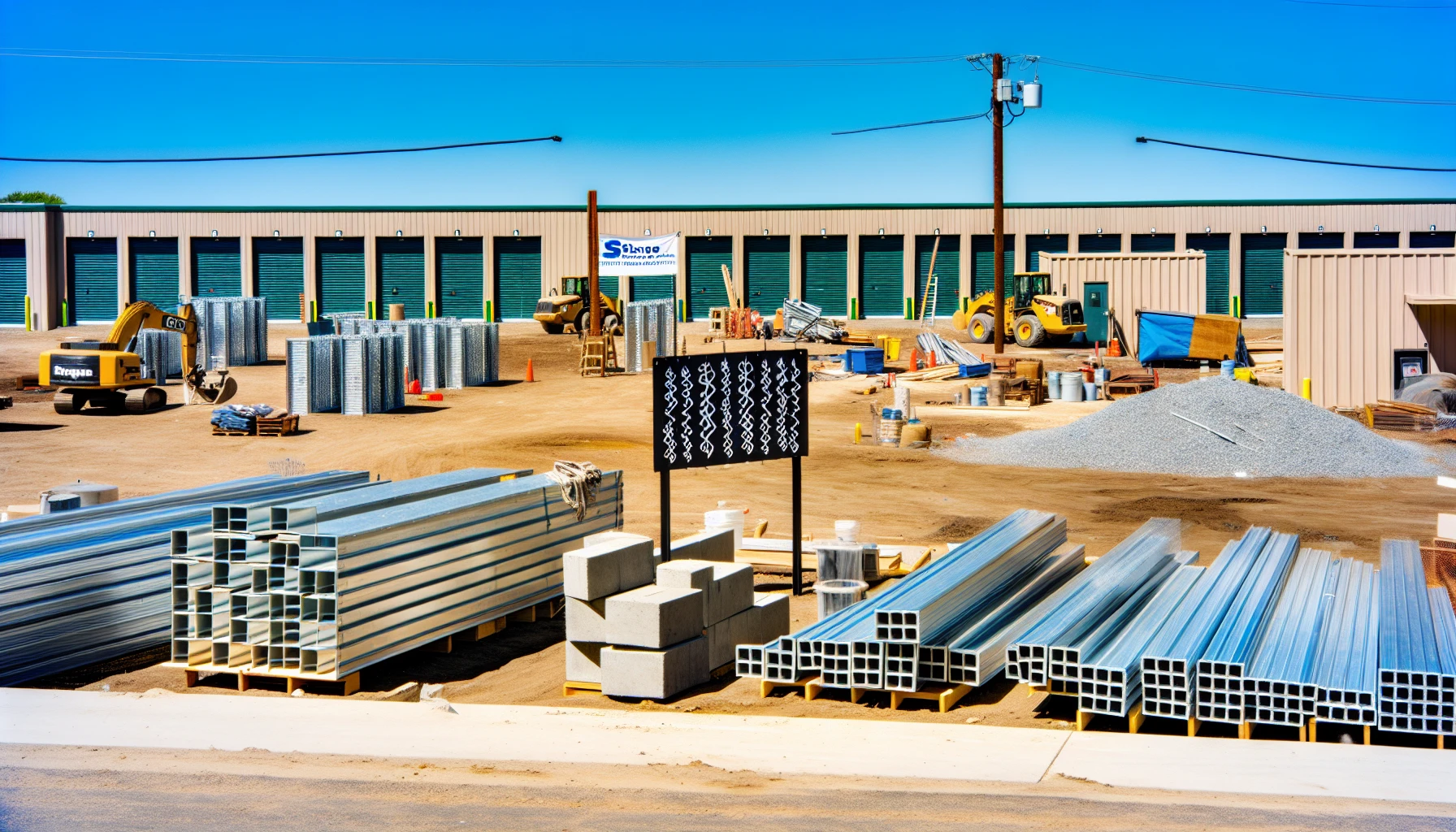
Are you looking to acquire, renovate, or expand your self-storage facility but unsure about the financing options available? Unlock the potential of self storage loan with this ultimate guide that explores various financing options, their benefits, and how to choose the right one for your business.

Self-storage loans are financing options specifically designed for the acquisition, construction, renovation, or expansion of self-storage facilities. These loans cater to different business needs, offering loan options such as SBA loans, conventional bank loans, and self-storage construction loans, among others.
Interest rates for self-storage financing vary depending on the type of loan you choose. Understanding the diverse loan options, their eligibility requirements, and repayment terms is key to making a judicious choice. These factors significantly influence the financial success of your storage property.

The Small Business Administration (SBA) offers two loan programs that provide long-term financing options for self-storage businesses with competitive interest rates and repayment terms. The SBA 7(a) and 504 loans cater to businesses seeking funds for acquiring, constructing, or renovating self-storage properties.
SBA 7(a) loans are a popular type of loan used by small businesses. They provide financial assistance to the self-storage sector as well. These loans can be used for purchasing an existing self-storage property or as an alternative to self-storage construction loans.
Funds attained from SBA 7(a) loan can be used for many purposes. These include short-term and long-term working capital, refinancing of business debt, procurement of assets, property, construction or renovations. The maximum term for a 7(a) loan is 25 years, with interest rates ranging from Prime +1 to Prime +2 under the 7a program.
SBA 504 loans offer long-term, fixed-rate financing of up to $5 million for:
The repayment terms for SBA 504 loans range from 10 to 25 years, with the borrower required to provide the remaining 10% as a down payment. Collaborating with seasoned self-storage lenders, knowledgeable about SBA 504 loans, can greatly enhance your likelihood of obtaining suitable financing for your facility.

Conventional financing through bank loans is a popular choice for self-storage businesses due to its competitive interest rates and terms. Securing a conventional bank loan can pose challenges, often necessitating a detailed business plan, a good credit score, and collateral.
Many lenders typically require a borrower to provide between 25-35% in equity to ensure the security of underwriting a conventional loan. When securing conventional financing for your storage property, assessing more than just the interest rate and considering the pros and cons of the loan is important.
Bridge loans are temporary financing options with high-interest rates, providing an ideal solution for those looking to:
The typical term of a bridge loan ranges from six to 48 months, with a loan range from $1 million to $10 million. Bridge loans can be repaid by refinancing to a more permanent loan, making them a useful short-term solution for self-storage operators in need of quick funding.

Construction loans are specifically tailored to finance the construction of self-storage facilities, providing funding for situations where no current storage facilities are present. The term length of these loans typically corresponds to the duration of the construction project, with a balloon payment due upon completion.
Securing a construction loan typically necessitates a down payment of up to 25% of the project’s cost. Detailed study of factors such as occupancy levels, population and growth rates, and past revenue and expenditure records can enhance the likelihood of approval for a construction loan for a new self-storage facility.
In addition to traditional loans, self-storage businesses can explore alternative financing options such as hard money loans, mezzanine loans, and lines of credit. These options offer flexibility and can be tailored to suit different business needs and circumstances, including the acquisition of self storage units.
Hard money loans are:
These loans, often provided by credit unions, are secured by the value of the property being purchased, rather than the borrower’s creditworthiness.
The eligibility criteria for hard money loans may vary from lender to lender. Comprehensive scrutiny of potential lenders is necessary for borrowers to ensure their reliability and credibility. Detailed due diligence can assist borrowers in securing a favorable agreement for their self-storage project.
Mezzanine loans are a form of capital situated between senior debt and equity in the capital stack, typically priced higher than senior debt and with additional fees. They can be beneficial to self-storage operations by providing additional capital for expansion, renovation, or acquisition of new properties, thereby bridging the gap between the amount of senior debt available and the total financing needed for a project.
Interest rates for mezzanine loans in self-storage financing generally range from 6.75% to 8%, though they may reach as high as 10% to 30% for short-term financing options. The exact interest rate is contingent upon factors such as debt coverage, loan-to-value ratio (LTV), and loan size.
A line of credit for a self-storage business provides access to a predetermined amount of funds that can be borrowed and repaid as needed. This type of financing offers flexibility, allowing the business to use the funds for various purposes, including paying short-term expenses or investing in growth opportunities.
Interest is only charged on the amount borrowed, and the business can continue to borrow and repay funds within the credit limit. Evaluating creditworthiness and business finances is vital to qualify for a line of credit.
Selecting the optimal financing option for your self-storage business involves evaluating various lending scenarios and considering factors like interest rates, repayment terms, and eligibility requirements. The appropriate loan program can greatly influence the financial stability and enduring success of your self-storage operation.
As you navigate the self-storage financing landscape, partnering with experienced lenders and financial advisors can help you better understand the various loan options available and identify the most suitable financing solution for your business.

A successful loan application necessitates a robust business plan, financial forecasts, and pertinent documentation, showcasing the feasibility and profitability of your self-storage project. A comprehensive business plan should encompass your vision, target market, marketing strategies, operational costs, and financial forecasts.
Financial projections required for a self-storage loan application include:
Providing accurate and detailed financial information can greatly improve your chances of securing the right loan for your self-storage business.
Partnering with experienced lenders and financial advisors can help you navigate the self-storage financing process, increasing your chances of securing the right loan for your business. These professionals can assist you in exploring multiple commercial real estate financing options and identify the most suitable one for your self-storage business.
Engaging lenders experienced in self-storage loans presents various benefits, such as:
Capitalizing on their expertise, you can make judicious decisions and secure the optimal financing option for your existing self storage facility project.
In conclusion, understanding various self-storage loan options and their respective benefits is crucial for the success of your self-storage business. From SBA loans to conventional financing and alternative solutions, each financing option offers unique advantages. By carefully evaluating lending scenarios, working with experienced lenders and financial advisors, and preparing a solid loan application, you can secure the right financing to grow and prosper in the self-storage industry.
Self storage is a great investment due to its low operational costs, resulting in high profit margins and lower business and operating risks. Operational costs range from 30-40% of effective gross income, providing investors with a hassle-free way to generate returns.
Self-storage can provide a way station for holding your items when moving to a new home and the new premises are not yet available, preventing you from being left in a difficult situation.
Storage business can be highly profitable, as evidenced by annual income ranging from $365,000 to $800,000. This makes it a great option for those looking to enter the entrepreneurial space.
The main types of loans available for self-storage businesses include SBA loans, conventional bank loans, bridge loans, construction loans, and alternative financing options such as hard money loans, mezzanine loans, and lines of credit.
When selecting the ideal loan program for your self-storage business, make sure to consider factors such as interest rates, repayment terms, and eligibility requirements. This will help you determine the most suitable option for your needs.